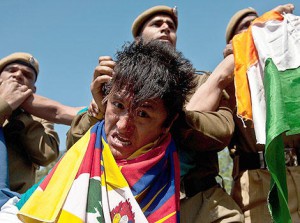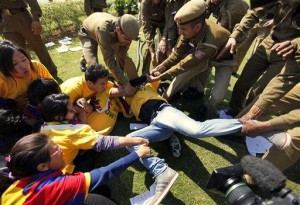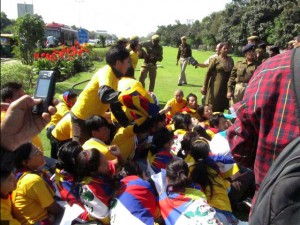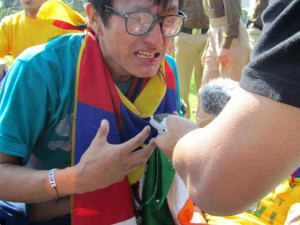
(ལྡི་ལིའི་བོད་རིགས་མཐོ་རིམ་སློབ་མ་ལྔ་བཅུ་ལྷག་གིས་རྒྱ་ནག་གཞུང་ཚབ་ཁང་གི་མདུན་ནས་ངོ་རྒོལ་གྱི་ལས་འགུལ་སྤེལ་བ།)
སྦྲ་རིགས་ཐོགས་མེད་ཀྱིས་གནས་ཚུལ་བསྡུ་སྒྲིག་བྱས།
ངོ་རྒོལ་གྱི་ཟླ་དུས་ཚེས་གྲངས།
ཕྱི་ལོ་ ༢༠༡༡ ཟླ ༠༣ ཚེས ༠༩
ངོ་རྒོལ་གྱི་ས་གནས།
ལྡི་ལིའི་རྒྱ་ནག་གཞུང་ཚབ་ཁང་གི་མདུན་ཐང་།
ངོ་རྒོལ་གྱི་དམིགས་ཡུལ།
ཕྱི་ལོ ༡༩༥༩ ཟླ ༠༣ ཚེས ༡༠ ཉིན་རྒྱ་དམར་དྲག་པོའི་དཔུང་གིས་བོད་མི་ཁྲི་སྟོང་མང་བོ་དམར་གསོད་དང་ བོད་ས་ཡོངས་རྫོགས་ལ་བཙན་དབང་བསྒྱུར་ནས་ལོ་ངོ་ཧྲིལ་བོ་ལྔ་བཅུ་ང་གཉིས་འཁོར་བའི་མྱ་ངན་རྗེས་དྲན།
(གསར་འགྱུར་མདོར་བསྡུས།)
དེ་རིང་སྔ་ངོ་ལྡི་ལིར་གཙུག་ལག་སློབ་ཁང་འདྲ་མིན་ནང་སློབ་གཉེར་གནང་བཞིན་པའི་བོད་རིགས་མཐོ་རིམ་སློབ་མ་ལྔ་བཅུ་ལྷག་དང་།གཞན་བོད་པ་གཞོན་སྐྱེས་ཁ་ཤས་བཅས་ཁྱོན་སྐྱ་སེར་དྲུག་ཅུ་ལྷག་གིས་ལྡི་ལིར་ཡོད་པའི་རྒྱ་ནག་གཞུང་ཚབ་ཁང་གི་མདུན་ཐང་དུ་རྒྱ་དམར་དྲག་པོའི་དམག་དཔུང་གིས་བོད་ས་ཡོངས་རྫོགས་དྲག་པོས་དབང་བསྒྱུར་དང་།ཉེས་མེད་བོད་མི་ཁྲི་སྟ ོང་མང་བོ་དམར་གསོད་བཏང་ནས་ལོ་ངོ་ཧྲིལ་བོ་ལྔ་བཅུ་ང་གཉིས་འཁོར་བའི་མྱ་ངན་རྗེས་དྲན་གྱི་རྔམ་སྟོན་ཁྲོམ་སྐོར་བྱས་སོང་ལ།
 མཐོ་སློབ་ས་གནས་གཞོན་ནུ་ཚོགས་པས་སྣེ་ཁྲིད་དེ་སྤེལ་བའི་བོད་ཀྱི་གཞོན་སྐྱེས་ཚོའི་ལས་འགུལ་དེ་རིང་ཉིན་གུང་ནས་བཟུང་རྒྱ་གར་གྱི་ཚགས་པར་དང་བརྙན་འཕྲིན་ཁང་ཆེ་ཁག་ཚང་མས་དོ་སྣང་ཆེན་པོས་ཐད་གཏོང་བྱེད་བཞིན་འདུག ངོ་རྒོལ་མཁན་དག་ལ་ཉིན་ཤས་སྔོན་ནས་བོད་རང་བཙན་སློབ་ཕྲུག་ཚོགས་པས་བཀོད་སྒྲིག་འོག་དེང་རབས་ཞི་བའི་ངོ་རྒོལ་ཐབས་ཇུས་ཀྱི་སྦྱོང་བརྡར་ཐོབ་ཡོད་པར་བརྟེན་ས་གནས་རྒྱ་གར་ཉེན་རྟོག་དམག་མི་ཅི་བྱེད་འདི་བྱེད་མེད་པར་བཟོས་ཡོད་པ་རེད།འོན་ཀྱང་།ཐ་མར་དམག་མི་འབོར་ཆེན་སླེབས་ནས་ངོ་རྒོལ་བྱེད་མཁན་དག་རེ་རེ་བཞིན་བཙན་གྱིས་འཇུས་ནས་ཁྲིམས་ཁང་དུ་ཁྲིད་སོང་། ཆུ་ཚོད་གསུམ་ལྷག་རིང་ཁོ་ཚོར་རེ་རེ་བཞིན་ཁྲིམས་ཞིབ་པས་འདྲི་གཅོད་བྱས་ཟིན་རྗེས་བདུན་ཕྲག་གཅིག་གི་བཙོན་འཇུག་ཁྲིམས་ཐག་བཅད་འདུག
མཐོ་སློབ་ས་གནས་གཞོན་ནུ་ཚོགས་པས་སྣེ་ཁྲིད་དེ་སྤེལ་བའི་བོད་ཀྱི་གཞོན་སྐྱེས་ཚོའི་ལས་འགུལ་དེ་རིང་ཉིན་གུང་ནས་བཟུང་རྒྱ་གར་གྱི་ཚགས་པར་དང་བརྙན་འཕྲིན་ཁང་ཆེ་ཁག་ཚང་མས་དོ་སྣང་ཆེན་པོས་ཐད་གཏོང་བྱེད་བཞིན་འདུག ངོ་རྒོལ་མཁན་དག་ལ་ཉིན་ཤས་སྔོན་ནས་བོད་རང་བཙན་སློབ་ཕྲུག་ཚོགས་པས་བཀོད་སྒྲིག་འོག་དེང་རབས་ཞི་བའི་ངོ་རྒོལ་ཐབས་ཇུས་ཀྱི་སྦྱོང་བརྡར་ཐོབ་ཡོད་པར་བརྟེན་ས་གནས་རྒྱ་གར་ཉེན་རྟོག་དམག་མི་ཅི་བྱེད་འདི་བྱེད་མེད་པར་བཟོས་ཡོད་པ་རེད།འོན་ཀྱང་།ཐ་མར་དམག་མི་འབོར་ཆེན་སླེབས་ནས་ངོ་རྒོལ་བྱེད་མཁན་དག་རེ་རེ་བཞིན་བཙན་གྱིས་འཇུས་ནས་ཁྲིམས་ཁང་དུ་ཁྲིད་སོང་། ཆུ་ཚོད་གསུམ་ལྷག་རིང་ཁོ་ཚོར་རེ་རེ་བཞིན་ཁྲིམས་ཞིབ་པས་འདྲི་གཅོད་བྱས་ཟིན་རྗེས་བདུན་ཕྲག་གཅིག་གི་བཙོན་འཇུག་ཁྲིམས་ཐག་བཅད་འདུག

གསར་འགྱུར་དང་རླུང་འཕྲིན་བརྒྱུད་ལམ་ཁག་གཞན་དག་ལ་གཟིགས་རོགས་ཞུ།
1) http://blogs.voanews.com/breaking-news/2011/03/09/tibetan-protesters-detained-in-new-delhi/
2)http://www.phayul.com/news/article.aspx?id=29207&article=Several+Tibetan+protesters+detained+in+India
3) http://www.ndtv.com/article/cities/tibetans-protest-outside-chinese-embassy-90477?utm_source=feedburner&utm_medium=feed&utm_campaign=Feed:+ndtv/Lsgd+(NDTV+News+-+India)
4) http://1click.indiatimes.com/article/0eAb9Tt1PacJa?q=New+Delhi


རྒྱལ་ཁབ་ཤོར་ནས་མི་ལོ་ལྔ་བཅུ་ལྷག་ཕྱིན་ནའང་བོད་མི་ཚོས་ད་དུང་རྩ་དོན་མ་བརྗེད་པར་འཐབ་རྩོད་ཀྱི་རྒྱུན་མུ་མཐུད་སྐྱོང་བཞིན་པ་འདི་འདྲ་མཐོང་ཐོས་བྱུང་ཐེངས་རེར་སེམས་པ་དགའ་སྤོབས་ཀྱིས་ཁེངས་འོང་གི་འདུག ལྷག་པར་ཏུ་གཞོན་སྐྱེས་ཚོས་འཐབ་རྩོད་ཀྱི་སྣེ་འཁྲིད་སྟངས་འདིས་ང་ཚོར་རེ་བཞག་གསར་བ་ཞིག་གི་འགོ་བསླང་འོང་གི་འདུག་ཨང་། རེད། སང་ཉིན་ནི་སུམ་ཅུ་དུས་དྲན་རེད། བོད་མི་ཚོ་ལོངས་ཤོག རང་རང་ས་ནས་ལོངས་ཤོག དེ་ཡང་ཨ་རི་དང་ཡོ་རོབ་སོགས་འཛམ་གླིང་གང་ས་ནས་ལོངས་ཤོག།
མཁས་དབང་བློ་སེང་ལ་བཀའ་ཁྲི་འོས་བླུག་གནང་རོག
དཀོན་མཆོག་མཁྱེན། རྒྱ་གར་འདིབོད་མིའི་སྒང་ལ་ཅིག་མགྱོགས་པ་འདུག རྡོག་པ་ཕྱི་ལ་ཐོན་མ་ཐོན་འཇུས་ཚར་
འདུག་
གཞོན་སྐྱེས་སྙིང་སྟོབས་ཅན་ཁོང་རྣམ་པར་སེམས་གཏིང་ནས་རྒྱབ་སྐྱོར་དང་ཐུགས་རྗེ་ཆེ་ཞུ་རྒྱུ་ཡིན།
༡) སྤྱིར་བཏང་སྐུ་ངོ་བཀྲས་ཐོང་ལགས་ནི་བཀའ་མོལ་གནང་བཏང་ནི་ཡག་པོ་ཞེ་དྲག་འདུག་དེ་་ནི་སྒེར་གྱིས་བསོད་ནམས་ལས་འབྲས་ལུས་ཡིན་མ་ཟད་སྐུ་དྲག་གི་ནང་མི་ཡིན་ཙང་༡༩༥༩ ཡི་སྐུ་ངལ་རྩ་ནས་མ་མྱོང་བར་དེའི་སྔོན་ལ་ཀ་ལིང་པུང་ལ་སློབ་གྲར་སྐྱོད་ཡོད་པ་རེད་ བྱས་ཙང་དེང་སང་ རྒྱ་གར་ཁམས་པ་དང་གཅིག་མཚུངས་རེད།
༢) ཕྱིས་སུ་མ་སུ་རི་སློབ་གྲའི་ནང་༥༩ ནས་ཉམ་ཐག་བཙན་བྱོལ་སློབ་ཕྲུག་གྲས་ལ་སོང་། འོན་ཀྱང་ཐབས་སྐྱོ་ལས་དོན་དེ་བཀའ་བློན་ལས་ཐོག་མཐའ་མ་ཆོལ་པར་རང་གི་གཟའ་ཟླ་ནང་མི་ཚེ་མདུན་ལམ་ཆེད་བཙན་བྱོལ་སྒྲིག་གཞི་དྷ་སའི་བཙན་བྱོལ་གཞུང་འཁོར་བའི་ལས་རྙོག་རབ་ཏུ་སྤང་ནས་ཨ་རིའི་ཞིང་ཁམས་ལ་བསྙེན་པར་རྫོགས་། སྐུ་ངོ་ཁོང་རང་རེ་མི་མང་ཉམས་གཟིགས་སྐྱོང་གང་འདྲ་ཡོད་མེ་ཤིན་ཏུ་ཐེ་ཚོམ་རེད།
http://www.bbc.co.uk/news/world-asia-pacific-12689911
བུ་རྒོད་ཚོའི་བུ་ལྷ་གནམ་གྱིས་འཚོས།
10 March 2011 Last updated at 05:55 GMT
Share this page
* Facebook
* Twitter
* Share
* Email
* Print
Tibet’s exiled Dalai Lama to devolve political role
Dalai Lama at Mumbai University. 18 Feb 2011 The Dalai Lama has said he only wants greater autonomy for Tibet
Continue reading the main story
Related Stories
* China imposes Tibet travel limits
* China wants Dalai Lama struggle
* Q&A: China and Tibet
Tibet’s exiled spiritual leader the Dalai Lama has announced a long-awaited plan to devolve his political responsibilities to an elected figure.
The Dalai Lama said he would begin the formal process of stepping down at a meeting of the Tibetan parliament-in-exile next Monday.
He said the move would be to the long-term benefit of Tibetans.
The announcement came in a speech by the Dalai Lama marking the anniversary of the 1959 Tibetan uprising.
“As early as the 1960s, I have repeatedly stressed that Tibetans need a leader, elected freely by the Tibetan people, to whom I can devolve power,” he said at Dharamsala, the Indian town that has become his base.
“Now, we have clearly reached the time to put this into effect.”
He added that his decision was not made because he wanted to “shirk responsibility” or felt disheartened.
The BBC’s Mark Dummett in Delhi says that whoever replaces the Dalai Lama faces a daunting task, as no other Tibetan comes close to matching his authority as a spiritual and political leader.
He also called on China’s leaders to show greater transparency.
“China, with the world’s largest population, is an emerging world power and I admire the economic development it has made,” he said.
“It also has huge potential to contribute to human progress and world peace. But to do that, China must earn the international community’s respect and trust. In order to earn such respect China’s leaders must develop greater transparency, their actions corresponding to their words. To ensure this, freedom of expression and freedom of the press are essential.”
Continue reading the main story
The Tibet Divide
* China says Tibet was always part of its territory
* Tibet enjoyed long periods of autonomy before 20th Century
* In 1950, China launched a military assault
* Opposition to Chinese rule led to a bloody uprising in 1959
* Tibet’s spiritual leader the Dalai Lama fled to India
* Dalai Lama now advocates a “middle way” with Beijing, seeking autonomy but not independence
* Is development killing Tibet’s way of life?
The Dalai Lama, who heads Tibet’s exiled government, has lived in Dharamsala since fleeing across the Himalayas following the failed 1959 uprising against Chinese rule.
He has said he does not want independence for Tibet, only meaningful autonomy.
The Dalai Lama is routinely vilified by the Chinese authorities.
In the run up to the anniversary, police in the Indian capital Delhi detained more than 30 Tibetan exiles protesting outside the Chinese embassy on Wednesday.
The protesters wore yellow T-shirts and waved red and blue Tibetan flags, chanting “Free Tibet” and “We want freedom”.
Chinese officials have recently announced travel restrictions to Tibet ahead of the third anniversary of riots there.
In March 2008, Tibet witnessed a wave of violent anti-China protests – the worst unrest there for 20 years.
Beijing blamed the unrest on followers of the Dalai Lama, who it said were seeking to separate Tibet from China.
China responded to the unrest with a massive military crackdown.
Many Tibetans have complained about the growing domination of China’s majority Han population in Tibet and accuse the government of trying to dilute their culture.
མི་རབས་གསར་པ་ལ་གསོན་ཤུགས་ཀྱིས་ཁེངས་ཡོད་ལ།་མི་རབས་གསར་པས་རང་ཉིད་ཀྱི་ཉིན་རེའི་སློབ་སྦྱོང་བྱེད་ཞོར་བོད་ཀྱི་རྩ་དོན་ནམ་ཡང་བརྗེད་ཀྱི་མེད་པས། མ་འོངས་པའི་རེ་བ་དང་ཡིད་ཆེས་མཐའ་དག་མི་རབས་གསར་བ་ལ་བཅོལ་ཆོག
བོད་རབ་བཙན་རྒྱལ་གྱུར་ཅིག བོད་རབ་བཙན་སློབ་ཕྲུག་ཚོགས་པ་རྒྱལ་གྱུར་ཅིག གདུང་སེམས་མཉམ་སྐྱེད་ཡོད།
ཞར་ལ་དྲན་སྐུལ་བྱེདརྒྱུ། སུམ་བཅུའི་དུས་དྲན་དང་བོད་དོན་གླེང་སྐབས་ཀླུ་སྨྱོན་ཟེར་མི་དང་སྟག་སྨྱོན་ཟེར་མི་དེ་ཚོ་གྲིབ་ནག་ཙམ་ཡང་མཐོང་རྒྱུ་མི་འདུག ད་དུང་ད་དུང་ཨ་མདོ་བ་གཅིག་གཅིག་མ་མ་ཟེར་མཁན་དེ་ཚོ་མིང་ཙམ་ཡང་མཐོང་རྒྱུ་མེད། རྒྱ་ཕོག་རག་གི་ཡོད་མེད་མི་ཤེས་ཀྱང་སྐྱག་ཁང་དང་ཟ་ཁང་གི་སྦྱིན་བདག་རྒྱ་མི་ཡིན་པས་ལོན་པ་རེད་སྙམ། གང་ལྟར་ཡང་།་ཨམ་ཞེན་གྱིས་སྨྱོ་ནས་བོད་རིགས་ནང་ཁུལ་ལ་དམའ་འབེབས་འདྲ་མིན་བྱེད་མཁན་BBC ལྟ་བུ་ཡིན་ན་བོད་ལ་ཤ་ཞེན་དང་རྒྱ་ལ་སྡང་ཞུག་ལྡན་པས་དགའ་བསུ་ཡོད། གཞན་ནང་འཁྲུགས་དང་དཀྲུག་ཤིང་ནང་འཚང་ཀ་རྒྱག་མཁན་དེ་ཚོ་འདིའི་ནང་མིང་ཙམ་ཡང་མཐོང་རྒྱུམེད་པས། བོད་བཞུགས་རྒྱལ་བཅེས་པ་ཚོས་ཅིས་ཀྱང་དོ་སྣང་གནང་དགོས། འབོད་བསྐུལ་གལ་ཆེ་ཡིན། དྲ་བདག་ཨ་མདོ་བ་ཡིན་པས་འདི་ཡུན་རིང་བཞག་གི་མ་རེད། བཀླགས་ནས་ཐུགས་ལ་ངེས་པ་བཟོ་རོགས།
སྲིད་ཐར་ལགས། བོད་”རབ་བཙན”ཟེར་ན་ཅི་ཟེར་ལེ་རེད།
ཁྱེད་ཚོའི་སྙིང་སྟོབས་ལ་ཡིད་རངས་ཞུས། ཚོར་བ་སྐྱེན་པོ་ཞིག་གི་འོག་ནས་ཆབ་སྲིད་ཀྱི་ཁོར་ཡུག་འཁྲུག་པའམ་ནོར་ཉེན་ཡང་ཡོང་སྲིད་པས་ཡིད་གཟབ་བྱོས་ཤིག་བོད་ཀྱི་སོན་རྩ་རྣམས། ཐུགས་རྗེ་ཆེ།